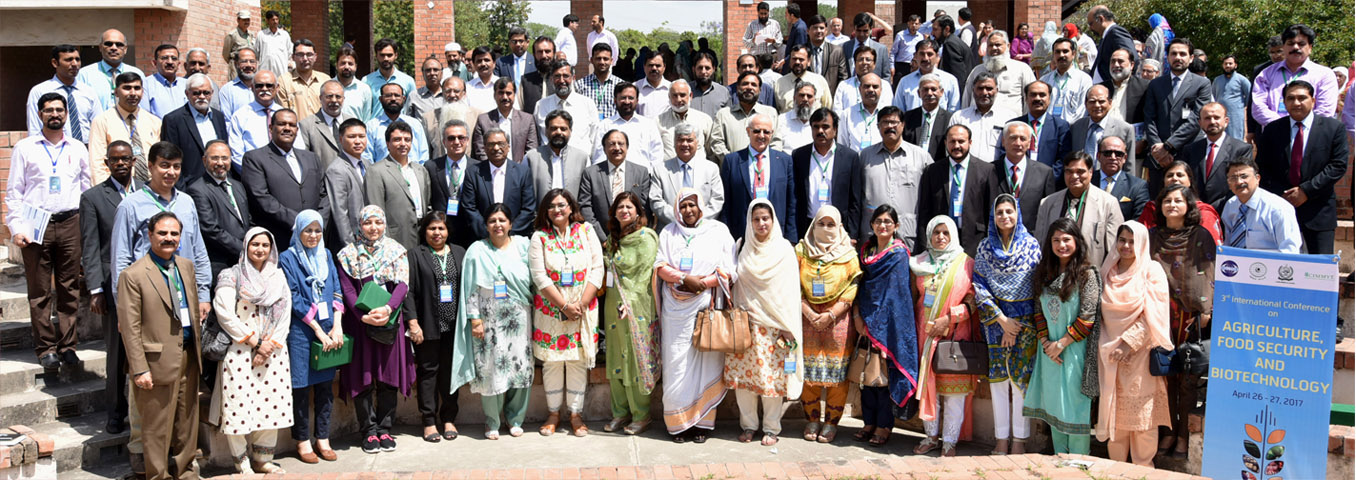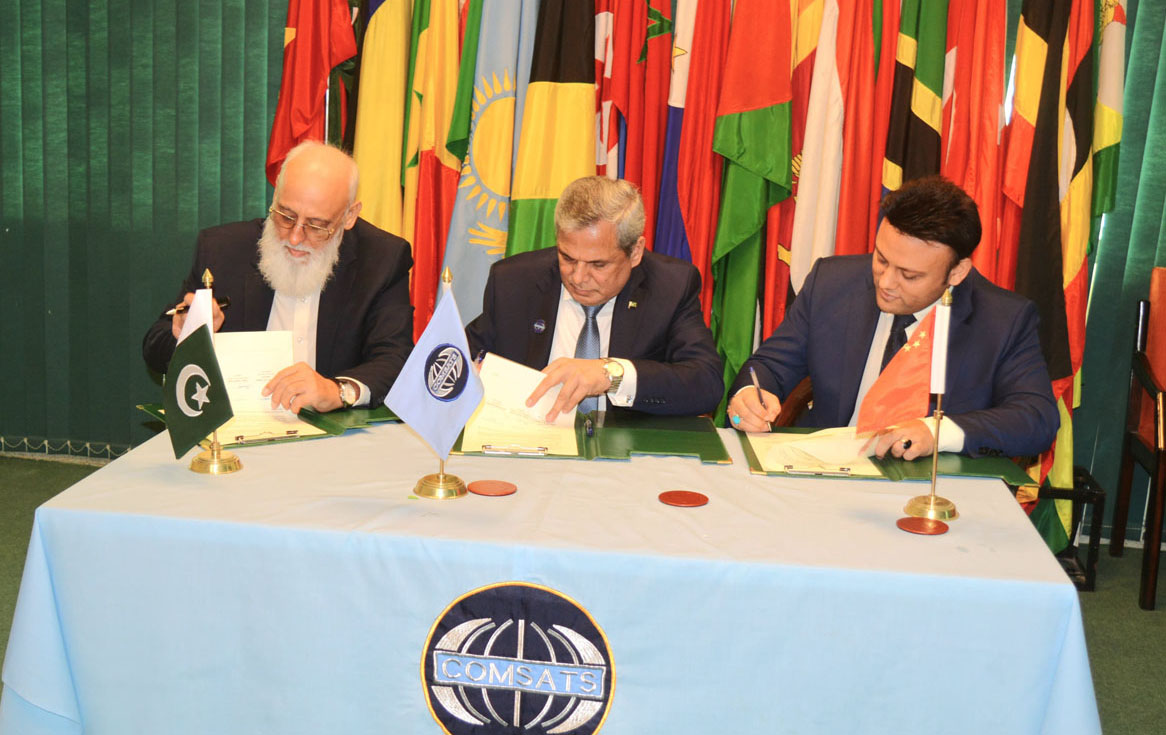The 3rd International Conference on Agriculture, Food Security and Biotechnology was held from 26th April to 27th April 2017, at the National Agriculture Research Centre, Islamabad, Pakistan. The 2-day Conference was jointly organized by COMSATS in collaboration with ISESCO and Pakistan Agricultural Research Council (PARC).
The inaugural session of the workshop was attended by more than 130 national and international academicians and scientists hailing from different countries, including Egypt, Turkey, Tunisia, Sudan, Iran, Sri Lanka, and Uzbekistan. The Minister for Food Security and Research, Pakistan, His Excellency, Mr. Sikandar Hayat Khan Bosan, graced the occasion with his presence as Chief Guest.
Speaking on the occasion, the Chief Guest considered it the right time to encourage and support smart agricultural practices, and expected the same outcome from the event. His Excellency assured full support of the Ministry help with initiatives relevant to sustainable food security.
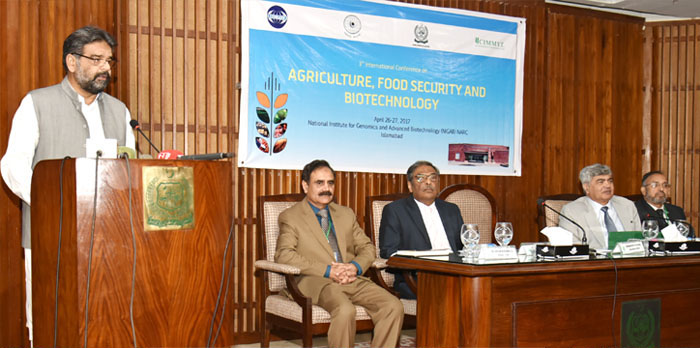 |
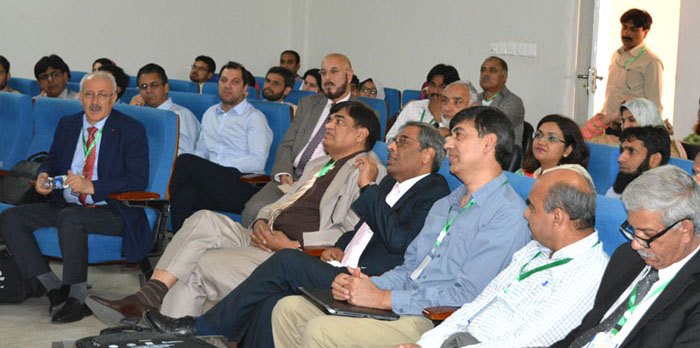 |
The Executive Director COMSATS, Dr. S. M. Junaid Zaidi, in his message noted that biotechnology’s influence on food production and agriculture is undeniable, especially for countries like Pakistan with fertile lands and good weather conditions’. The Executive Director COMSATS encouraged scientists, farmers and extension specialists to create a regular forum for discussions on issues related to the theme of the Conference. Further, he hoped that this event will help in identifying new, better and innovative ways to making agricultural biotechnologies available, accessible and applicable to those who need them the most.
Dr. Abdulaziz Othman Altwaijri, Director General ISESCO, in his message stressed the need to provide an enriching and engaging environment to foster crop science research towards new and improved livelihood opportunities, and sustainable food and nutrition security for farmers in developing countries. He hoped that the conference will reflect on the current and future trends that require initiatives for identifying optimal solutions to the problems in the fields of agriculture, food security, and biotechnology.
Representing PARC, Dr. Yusuf Zafar, Chairman PARC, noted that despite many scientific advances during the past four decades, the developing world is facing the challenge of producing adequate food sustainably while conserving natural resources. He opined that to achieve and maintain productivity and sustainability of agricultural systems, it is crucial to be alert, and informed about new technologies that could change production and consumption concepts, standards and paradigms.
Dr. Ghulam Muhammad Ali, Member Coordination and Monitoring, PARC, Islamabad, mentioned that science and technology need to further advance to ensure food security and safety. He stated that this event is another critical step in PARC’s efforts in order to reach zero hunger, improve nutrition and promote sustainable food systems.
In the keynote speech at the Inaugural session, Dr. Kauser A. Malik, Department of Biological Sciences, FC College Lahore, opined that the fear of unknown keeps the human beings away from adopting new technologies, and advocated the use of genetically modified crops for addressing hunger.
The inaugural session was concluded with distribution of shields to international speakers from different countries.
The 2 day conference covered a total of 7 sessions including an inaugural session, 5 technical sessions and a parallel poster session. The technical sessions of the conference constituted 32 lectures in total and took a multi-sectoral approach, encompassing the crop, livestock, forestry and fishery sectors, as well as the use of microorganisms within these sectors. The Programme covered a wide range of topics, such as genome sequencing methods to marker-assisted breeding for crop improvement; microbial bio-pesticides and bio-stimulants to antimicrobial treatment for food safety; bio-products in plant protection; technologies of the agro-food products processing; and environmental risk assessment of transgenic plants to impact of development of agri-biotechnology research on food and economic security.
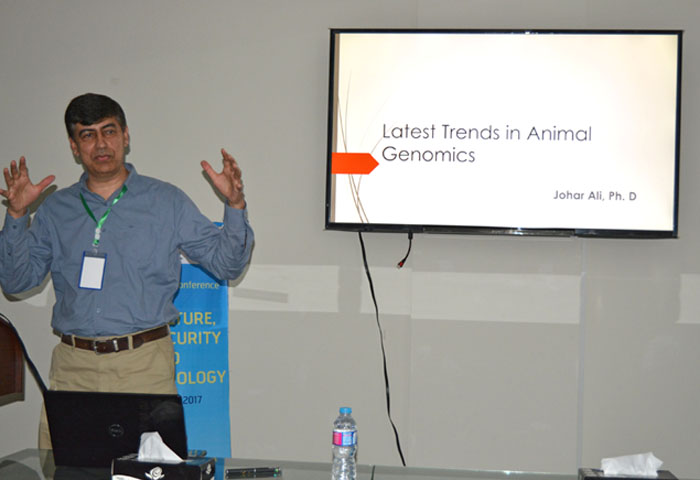 |
 |
The Conference underscored the importance of agricultural biotechnologies for achieving Sustainable Development Goals related to hunger and nutrition. A few distinguished local speakers from the event included Dr. Zabta Khan Shinwari, Quaid-i-Azam University (Islamabad); Dr. Johar Ali, PARC (Islamabad); Dr. Tayyab Hasnain, Centre of Excellence in Molecular Biology (Lahore); Dr. S.M. Saqlain Naqvi, PMAS Arid Agriculture University (Rawalpindi); and Dr. Aftab Bashir Forman Christian College (Lahore).
Presentations were made on research initiatives by scientists from various academic and research organizations including the COMSATS Institute of Information Technology (CIIT), Islamabad; National Institute for Genomics and Advanced Biotechnology (NIGAB), Islamabad; Centre of Agricultural Biochemistry and Biotechnology (CABB), Faisalabad; University of Gujrat; National Institute for Biotechnology and Genetic Engineering (NIBGE), Faisalabad; Punjab University, Lahore; Institute for Biotechnology and genetic Engineering (IBGE), Peshawar; Agricultural Biotechnology research Institute (ABRI), Faisalabad; Institute of Biomedical And Genetic Engineering, Islamabad; and Centre for Agriculture and Bioscience International (Rawalpindi).
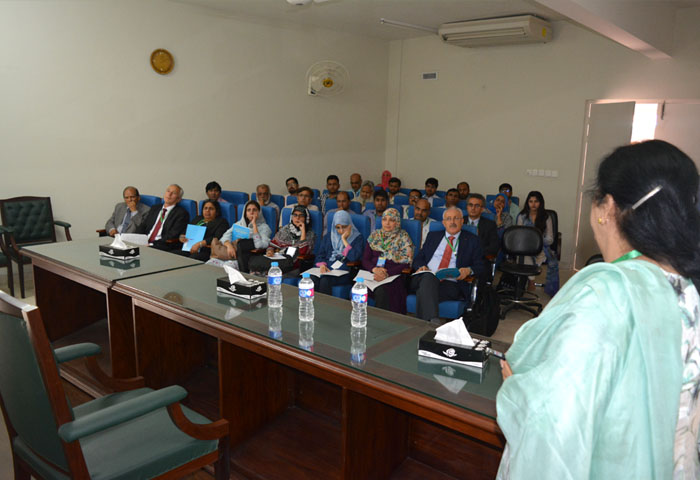 |
 |
The 35 posters covering a wide range of subjects in agricultural biotechnology were displayed throughout the event around the perimeter of the Conference Hall. Relevant Universities, R&D institutions and industries participated in the poster contest. The prizes for three best posters, based on novelty and potential for practical applications, were handed out during the concluding session on 27th April 2017.
The Conference ended on April 27, 2017, with closing remarks and vote of thanks by the representatives of the co-organizers of the event, Dr. Yusuf Zafar (PARC) and Mr. Tajammul Hussain (COMSATS). The international speakers, Dr. Zihni Demirbag, Karadeniz Technical University (Turkey), and Dr. Majid Javanmard Dakheli, Iranian research Organization for Science and Technology (Iran) also spoke at the concluding session. Certificates were also distributed among the participants.


